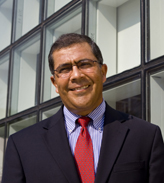Dr. Alfonso Ortega Speaks at Cisco Systems Symposium

On October 26-27, Dr. Alfonso Ortega, the College of Engineering’s Associate Dean for Graduate Studies and Research and the James R. Birle Professor of Energy Technology, visited the corporate headquarters of Cisco Systems, Inc., in San Jose, CA. The purpose of his visit was to deliver the keynote address at the company’s annual internal thermal symposium and to meet with leaders of several of the company’s business units to discuss the research activity and capabilities of the College of Engineering’s Laboratory for Advanced Thermal and Fluid Systems, of which Dr. Ortega is the founding director. As a result of this trip, Dr. Ortega hopes to explore new opportunities for collaboration between his lab and Cisco Systems on research and engineering development work.
For more than 10 years, Dr. Ortega—who was the only external speaker invited to participate at the symposium—has personally collaborated with thermal management specialists at Cisco Systems, which is a worldwide leader in networking hardware for the Internet. Because Dr. Ortega is a recognized expert on the air cooling of electronics, he is an excellent resource for IT companies such as Cisco Systems that seek sustainable solutions to the thermal management needs associated with today’s data centers.
In fact, the need for research in sustainability as it relates to the IT industry and for the implementation of sustainable practices was one of the messages that Dr. Ortega focused on in his address. He believes that “the IT industry increasingly needs to pay attention to the sustainable use of energy in every form and in every way. It needs to consider the overall dissipation of energy from a global perspective.”
During his talk, Dr. Ortega also offered an overview of his lab’s research, especially in the emerging area of small-scale systems that emphasize liquid as the coolant. In particular, he described three techniques that his lab is investigating: droplet impingement, micro-channel cooling, and synthetic jet technology.
